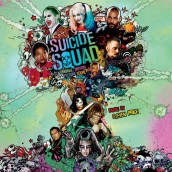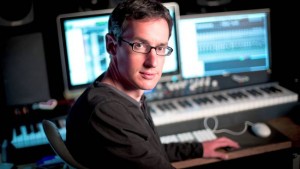
SUICIDE SQUAD composer Steven Price | ©2016 Steven Price
From THE MAGNIFICENT SEVEN to THE DIRTY DOZEN, Hollywood scores have rejoiced in teams of bad-asses determined to go out in a blaze of glory. But seldom has a composer done a Holy Hell blow out like Steven Price with SUICIDE SQUAD. Packing together a rogues gallery of wannabe Batman killers into a force of extraordinarily evil magnitude, the Oscar winner of GRAVITY creates an ironically unintended superhero score to kill them all. Taken from Arkham Asylum for their mad skills with weapons, sorcery, mutant powers and sensual psychotic chops, Price brings the hybrid rage of today’s action scoring to the next level, blending a muscular orchestra with metal guitar, adrenalin percussion samples and a myth-making chorus, as well as Joker cackles. Wrapped up with a myriad of motifs that emotionally distinguish their dysfunctional characters in a way that few super-team scores dare to attempt, Price’s SQUAD is united with a fiendishly bright, brassy theme that lets you know they’re the bad-good guys, with a Carmina Burana catchiness that’s likely to have listeners’ heads bobbing as if they were attending a Led Zeppelin concert.
Starting his career in the big league trenches as a music editor on the likes of THE LORD OF THE RINGS and BATMAN BEGINS, SUICIDE SQUAD represents a big level up for Steven Price, who’s positively mild-mannered when it comes to the thrilling mean-spiritedness he conjures for gang banger-as-film director David Ayer. The Oscar for outer space artiness is one thing, but striking savage gold in the multiplex with an attitude is a whole other deal for a composer who’s now brought a blast of freshness to the superhero thunder dome. It’s a perfect approach when you think of how DC superheroes are no better than psychos these days, and certainly no better way for the Squad to meet their maker when given the rocking personality that Price invests into his most impressive, and thrilling work yet.
ASSIGNMENT X: How important was being a music editor with a particular talent for temp tracking in becoming a unique film composer?
STEVEN PRICE: Music editing was one of the many jobs in film music I did along my 15 year journey towards finally being able to compose for a living, and I count myself very lucky that I had all of those experiences, all of which I still draw on in my work now. Temp music is a strange subject… many composers, including me, are not the biggest fans, in that it’s so easy for people to play safe if a temp score is thought to have “played well” at some exec screening or other. You could get stuck with an approach that has already been used countless times before. I used to be able to trace the “temp chain”… hearing where one score had influenced another, and it was often pretty depressing. However, one plus point of having done my share of temping work back in the day was that I got to the point where I could watch a scene and immediately hear in my mind a number of ways I could help that scene work, different approaches and styles of scoring. Now, when I’m looking at scoring a scene myself, I find that grounding helps me to look beyond those conventions. My first thought now is, “OK, well I think I know what would work on a basic level but how can I go beyond that to give the scene something unique, something that feels like it embodies this unique film?” It might be the harmonic language, or the instrumentation, or whatever the approach ends up being, but the plan is always to make the score undeniable… make it so the scene just feels right. For me, the greatest satisfaction is when a cue just feels bonded to the picture, and for that to be the case it needs such a bespoke approach. So that’s what I push for, and that’s probably why I sleep less than I should.
AX: Tell us about your initial scoring work with Edgar Wright’s productions of SCOTT PILGRIM. ATTACK THE BLOCK and THE WORLD’S END, and how they set up your particular style?
PRICE: Working with Edgar has been a massive highlight of my career so far, and I’m hugely grateful for the opportunities he’s given me. I guess if I were to isolate one thing I feel I’ve been able to develop through his guidance, it’s a sense that every detail matters. There’s not a shot in an Edgar Wright film, or a sound effect, a cut or a line, that hasn’t been thoroughly worked over to its greatest effect. So often there are subtexts and foreshadowing things happening in his movies, where all departments are coming together to tell the story on multiple levels. This totally carries through to the way he likes to use music. To be a part of that, and for the detail and layering to be so intrinsic to the filmmaking is something that I feel is a big part of what I try and do with my music.

GRAVITY soundtrack | ©2016 Water Tower Records
AX: How do you think you pushed your sound, and ideas of what a score could be with GRAVITY?
PRICE: My first meeting on Gravity featured the words “I hate film music.” So it was pretty clear I was going to have to find a unique way of scoring that film. The great thing about GRAVITY was that the way Alfonso Cuaron had conceived the movie just offered the most incredible, unique canvas for music. For a start, the lack of sound in the vacuum of space meant that I could write a very layered, detailed score with the confidence that any subtleties wouldn’t get lost in sound design at the final mix. Also, the way in which the film was shot to create the feeling you were up there in space opened up the possibilities of writing music for the surround experience in a way I’d never explored before. Combine all that with a director who would always push for something original, and would always focus on the emotional impact of the music, and it was a pretty much uniquely amazing musical opportunity. I learnt so much on that film. I did so many different versions of virtually every scene, and was pushed to continually come up with so many new ideas, that at the end of it I just emerged full of excitement about the possibilities of film music, and praying that I got to do another film one day. I was kind of aware that the score could go down in quite extreme ways – positively or negatively – so it was far from certain I’d get to have another go!
AX: What was the whole Oscar campaigning, and win for GRAVITY like? What was the impact like on your career?
PRICE: Looking back, it was a fantastic time, and totally surreal. You find yourself in all sorts of incredible places with people you’ve admired forever. The fact I was sitting next to John Williams, who was every bit the gentleman you would expect through the entire process, at the moment they made the award announcement; that’s something that has stuck with me ever since. To shake his hand, and that of Thomas Newman, at that moment… I still feel so fortunate to have been there and grateful to the film for giving me that opportunity. I’m very aware that it’s an honor to be invited into that particular world, and, with regards to my future career, I kind of figure that I will basically be spending the rest of my working life trying to live up to that honor. I think I’ll only really get a sense of the impact of the experience when a few more years have passed. At the very least, I got to write a couple more scores, and that’s made me very happy.
AX: How did you first meet up with David Ayer on FURY? What was that collaboration like, and how do you feel that a tank suicide squad, as it were, set you up for this movie?
PRICE: Again, the work on FURY started with a list of things David DIDN’T want the score to be. He wanted me to steer clear of what he felt were the clichés of war movies. We agreed that at no point would I write a solitary trumpet line as the sun rose over a battlefield, as effective as that had been in the past. From there it was what seems to be my usual process of evolving cues throughout the scoring period, sending David my latest work, and constantly tweaking and reworking things in trying to find the solution to the film’s puzzles. It felt like a smooth and enjoyable collaboration, from my perspective at least, and David would give the most amazing notes, really concise, but cutting straight to the heart of the relationships between the characters. I remember him telling me that one cue needed to “bring out the haunt” that a character was experiencing. Somehow when I returned to the piece it just made so much more sense, and I could move forward. I’d like to think the FURY experience created a level of trust between us that meant, when I started this one, I felt I could get stuck in and try some extreme things from day one.
AX: David has directed gang-intensive movies before like HARSH TIMES, STREET KINGS and END OF WATCH. In that respect, how much of a “gangster” approach did he want that would call back the past scores he’s gotten?
PRICE: We’ve never really discussed past scores together. David is always pushing for new music, and new thoughts, so looking back never really happens. But I immediately felt when working on SUICIDE SQUAD that the film totally had this recognizable quality of his films: that sense of the SQUAD themselves, this gang of misfits coming together in a believable way for a shared goal. Something in the way David writes and directs creates a real true sense of camaraderie amongst the characters. You instantly believe these relationships exist, and feel the shifting relationships between the gang members. The added dimension in this one, with this being a gang of, essentially, insane and troubled outsiders, who all come together and form this weird, dysfunctional and dangerous family gave me a lot to play with musically.
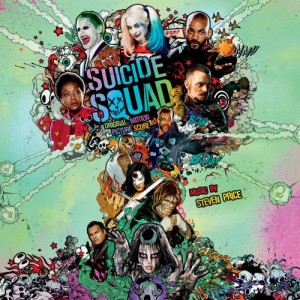
SUICIDE SQUAD soundtrack | ©2016 Water Tower Records
AX: Did you immerse yourself in the Squad’s comic book appearances before tackling the score?
PRICE: I’d read a fair bit when I was younger, but only since I finished scoring the film have I taken a closer look at the comics themselves. Before that I felt I only wanted to be responding to David’s interpretation of these characters, and this world, without any preconceptions at all. I didn’t want to drag any baggage into the process with me before I’d seen what David was doing. It’s kind of interesting now, though, looking back into the original comic books, just how much detail has gone into this film. There are so many details from the original comic books that the fans are going to pick up on, and this incredible sense of respect for the canon of it all. Hopefully, in being true musically to the way David has portrayed these characters, the score itself honors that history too.
AX: How difficult is it to make the bad guys musically heroic? And in that way, was it particularly important to make the their treatment more than one-dimensional?
PRICE: The very nature of the characters in the film ensured that the musical approach had to be multi-dimensional. These are truly the bad guys, and if there was going to be any sort of heroic feeling, no matter how skewed, it had to be earned. Take the character of Deadshot, who is Will Smith’s character and who I absolutely loved writing for. On one hand, he is, as one of the lines in the film has it, “a serial killer with a credit card.” He’s an incredible hit man, paid to kill. So nothing heroic there. But then we see how he’s fighting to see his daughter who he’s separated from, and how desperate he is to escape the life he’s in, and then see him in action, where, within his own reality, he’s someone who can be counted on in a battle, someone to fight alongside, and you start to feel way more connected to him. There’s a journey there, and I wanted the music to reflect that. And that’s just the one character! The performances in the film, without exception, allow you to believe in these complex characters and their situations, and so, for me, the job was to really immerse myself in those performances and support them in any way I could.
AX: Was the musical direction of SUICIDE SQUAD obvious from the start, or did it go through any major evolutions to get there?
PRICE: Some of the direction came really early. I remember going to Toronto when they were shooting to see some early scenes, and something about the colors of the film, and this sense of fun, the feeling that it’s a good time to spend with these extreme characters, sent me off to my studio knowing that I wanted to find a sound for the film that felt exciting, and gritty but, also somehow kind of rough around the edges. David and I would talk in terms of “adding the neon”, this extra layer of extreme, day-glo color that seemed to emerge from various combinations of distorted guitars, basses, analogue synths and delay pedals – some quite unhinged sounds running alongside the orchestra. That stuff seemed to land pretty quickly, and, whilst it evolved throughout, there are sounds in there that I recorded in my first couple of weeks on the film. The tricky thing was finding a way to portray some of the wilder characteristics of the Squad members in a way that didn’t overbalance things, when there’s so much extreme stuff happening onscreen throughout the film. Portraying someone with voices in their head, for example, but in a way that didn’t just feel so strange it would disorientate someone watching the film, and push them away from the character. That stuff could take some back and forth, and rethinks, but some of those moments have turned out to be the ones I’m most satisfied with
AX: Given so many members of The Suicide Squad, did you want to attempt to give the characters their own musical signature?
PRICE: I felt very strongly that I wanted this to be a thematic score. The characters are so strong and distinct it felt like it would be unforgivable to not try to give them some strong musical identities. In most cases this is the first time we’ve met these amazing people on the big screen, and I wanted to introduce them in as memorable way as I could. Obviously though, the concern would be that with such a large group of characters, the score could just become a procession of unrelated melodies, and that you’d never get a sense of things developing and truly telling this story. So I spent a lot of time thinking about that, how it would be possible to score the film in a thematic way, and yet allow the themes to earn their place, and evolve and develop along with the characters. An early conversation in the cutting room really helped me out. David talked of how each member of the Squad is, in their own way, an outsider from society. They don’t fit in, whether it be because of their abilities, or their predilections, their appearance or past crimes, or whatever else it may be. Really, the Suicide Squad, unlikely as it would seem for each of them, represents the first time they’ve actually belonged, even though it’s such an insane gang to be a part of. So, that got me thinking of ways in which the character themes could find their home in the main Squad music too, how their melodies, recurring rhythms, whatever felt right for each individual, but also somehow slightly incomplete and “other”, could also become part of the Squad’s musical identity as it starts to coalesce. So these themes could coexist, and play off each other as the film’s relationships develop. Working on that was a really fun part of scoring the film.
AX: How did the balance between more realistic villains like Captain Boomerang, and more supernatural / comic book ones like Enchantress affect the score?
PRICE: With all of the characters it was a case of finding their heartbeat and color, and then the balance came from the way they interact on the screen. Captain Boomerang is one of the funniest characters in the film, always looking for a win, always planning, but also with a really endearing quality, and his music tries to reflect that. There’s skittishness to him, but also a rough sweetness that I felt really came through in Jai Courtney’s performance. With Enchantress you’re dealing with this incredible timeless, mystical and powerful entity, which obviously led to a different approach. Her music features a lot of choral work, and some often quite extreme musical sound design. She has untold powers, and a sense of desperation that really felt like the music could fly to some quite extreme places with her.
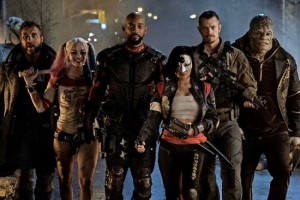
SUICIDE SQUAD | ©2016 Warner Bros.
AX: Harley Quinn and Deadshot are the two villains who’ve gotten the most play in the press. How did you want to play these characters, and their chemistry?
PRICE: As I think is clear from the trailers and surrounding press, the performances of Margot Robbie and Will Smith in this film are incredible. And their characters are so likeable but complex that they were a lot of fun to write for. Harley is this incredibly charming mixture of bad / good / happy / sad / manic / chilling… and yet you enjoy every second spent with her. So musically I just tried to join her in the journey, and capture the twists and turns. There’s some moments of real, bare emotion in her story, and it was a lot of fun to take her theme to those places, but also embrace the insanity of some of her other behavior. Likewise with Deadshot, the complexities of his character gave me a lot of musical opportunities. He’s represented by two main motives, one of which signifies his relationship with and love for his daughter, and is full of sadness and yearning, whilst another, more hopeful, reaching figure, shows him as the highly skilled soldier he is, using his skills to reach for a better life. As Harley and Deadshot get to know each other, and respect and like each other, there were moments where, as with the other characters, I got to combine their musical identities in various ways.
AX: Tell us about your approach to The Joker and Batman. Did you want the score to tie in at all to the DC musical universe that came before it especially given your work on films like BATMAN BEGINS?
PRICE: My aim with those two icons was always to play the characters as I saw them on screen in this specific film, and through David’s vision, rather than reflecting other differing approaches. Whilst there have obviously been so many incredible musical versions of these iconic characters over the years, here I wanted to be honest and true to this specific direction. For example in this film we see Batman from a different angle… we see him through the eyes of our villains. And to them, Batman soaring into the scene is truly bad news. So I played him musically that way. I hope when he enters the scene you really feel the same sense of dread that our protagonists do. Writing for Jared Leto’s Joker was also a massive joy. There’s so much in that performance, so much intensity and insanity, and it was fun to push those buttons. But there’s also a feeling of his true, twisted love and longing for Harley that gives the Joker’s music a sense of doomed and epic romance, all the time on the edge of falling off a cliff. Opportunities to write music like that don’t come up often!
AX: Hybrid scores that mix orchestra with electronics and samples are all the rage now, and SUICIDE SQUAD hits that bill and then some. How did you want to make that mixture here stand out from the pack?
PRICE: The nature of the fusion of the orchestra and the electronics was dictated totally by what was onscreen. I just had to work out how those insane images should sound! I think the film has a unique look – everything from the production design and costumes through to the tattoos on the Joker’s chest have this aesthetic that immediately made me want to find a distinctive sound that felt like it lived in the same world. Sometimes, the orchestra felt right alone in telling the story, but often I needed to find a way of distorting that, of making it less straight. The music had to feel like it had led this strange life. When I first saw the film, something abut the way it looked made me think of the kind of extreme, feedback-y guitar work of people like Robert Fripp, Adrian Belew, or my first boss, the Gang of Four guitar player Andy Gill. Playing with various textures gave me a way into the score that I couldn’t find with the orchestra alone and the combination evolved to feel pretty unique, I think and hope. The palette evolved until it felt right against the images.

SUICIDE SQUAD | ©2016 Warner Bros.
AX: The chorus plays a surprisingly big role in SUICIDE SQUAD. What do you think voices brought to the score?
PRICE: Something about the human voice just connects with me in a very pure way, and I love to work with singers, both individually and in larger groups. With a score as extreme as this, the way the human voice could be so immediately affecting in one scene, but so otherworldly in the next, meant it became an important part of my palette. Initially in the film, the female chorus itself is associated largely with the character of The Enchantress, whereby the male voice choir helped me conjure up the ancient, primal nature of Killer Croc. As things develop in the movie, it was great fun having the choir enunciate the “Ha Ha Ha!” laugh of the Joker over some critical moments of his story. The choir was superb. It was one of those sessions where things just fell into place and I feel they carry some important emotional weight within the music.
AX: After taking a relatively sparse approach to GRAVITY and FURY, was it particularly cool to really go for it with SUICIDE SQUAD?
PRICE: It was both great fun, and massively scary. Whilst my previous scores have had their share of complexities, the variety of music in Suicide Squad,” and it’s sheer scale, meant that I went into the sessions both incredibly excited to hear this music being performed by the musicians, but also utterly convinced that we’d never get through all of the music that I’d written in the time we had available! Thanks to the brilliance of the musicians it all worked out well, and there were some lovely moments where things came to life. In many ways, these recordings were less technical than other things I’ve done. With “Gravity” for example, I was recording individual lines separately so I could spin them around the surround speakers to immerse the audience in space so it was quite a dry process at times. Here though, there were occasions when the orchestra could throw themselves into a melody, and it was wonderful feeling the way that the musicians moved as one from phrase to phrase, adding those layers of humanity.
AX: When SUICIDE SQUAD is in full fury, it feels like a score as a rock concert in cues like “Are We Friends Or Are We Foes?” How did that draw on your own band background, especially in giving the characters their attitude?
PRICE: To me, it felt like the music for the film needed to have a lot of attitude and swagger. These people don’t fight clean, they don’t talk politely, they don’t care for niceties. So when things got lively it made sense to me that I could go big, and mean every note, and it didn’t feel right doing that in a purely traditional way. We were lucky to get Josh Freese in to play drums, and he’s one of the most powerful musicians I’ve ever spent time with. Just a great player, and grasped exactly what I was looking for as soon as I played him the demos. Added to that, there’s quite a lot of guitar playing in the score. I’ve wasted many years of my life making broadly obnoxious noises with guitars. My studio is full of far too many instruments, pedals and the like. So it was enormous fun to direct some of that energy into the score. There’s always a danger that guitars can sound a little lame in film scores, so I was determined to find the right sounds, and layer things up until they felt rough and ready enough for the Squad. I’m pleased I recorded all of the guitars on my own in the studio though, with no witnesses, as there were probably some embarrassing faces pulled as I played the main Suicide Squad riff.
AX: Conversely, how did you want to play SUICIDE SQUAD’s more emotional “downtime” music in comparison to the rest of the score’s insanity?
PRICE: One of the great things about the way David directs is that he’s not scared to give some space and stillness to emotional moments. He understands the value of lingering on a look, or a reaction. There are moments in the film when characters who, let’s face it, are not the nicest people in the world on a surface level, can really move you, and my job there was to find a space to allow that emotion to breathe. Within the thematic structure of the score, there were many occasions where I found myself getting more and more simple, with fewer and fewer notes, really finding the heart of a character’s theme for the moments when they were at their most damaged and vulnerable. David is excellent when it comes to clearing sound effects where appropriate in the final mix to give moments like that a resonance within the chaos of the rest of the film.
AX: Given that you’ve worked as an editor on high-pressure studio tentpoles, like THE LORD OF THE RINGS films, how did those experiences set you up for the anticipation, and pressures of a movie like this?
PRICE: My approach to everything that carries pressure or anticipation is to ignore that feeling as much as humanly possible. It’s not always easy, but I’m not sure thinking about the scale of a challenge too much is helpful. I kind of have this inner belief that so long as I keep moving forward and trying to do my job every day to the best of my ability, that’s as much as I can do. Everything else comes down to the way the cards fall. There’s no doubt that a project such as this brings with it a lot of pressure, and a lot of opinions and politics, but really if you can take a moment to truly focus (which can be tricky when all hell is breaking loose), you realize that most of what is going on around you is just noise, and nothing to do with what we’re trying to achieve. At the end of the day, we’re trying to tell a story. Within that story are a million decisions to make, all of which add up to the end result, but you can only take one of those decisions at a time. So I just try to keep moving forward, keep challenging myself to deliver work I feel enhances the story I’m working on, and, through it all, enjoy this amazing job. No matter what the pressures are, and really no external pressure is ever as extreme as the pressure you put on yourself to do your very best work, at the end of the day I get to sit in a room surrounded by musical instruments, and I get to share the things I come up with there with many wonderful musicians who all bring their talents to the piece. There is pressure, yes, but it’s a small price to pay for the privilege of doing the work.
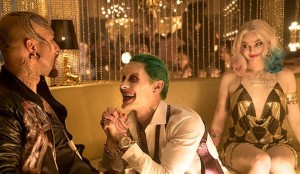
SUICIDE SQUAD | ©2016 Warner Bros.
AX: SUPERMAN VS. BATMAN was criticized for being way too dark, so that when the SUICIDE SQUAD additional shoots happened, the news was how they were meant to lighten up the film. Seeing that reaction, did it also fall onto you to give more of a “fun” feel to the score, especially with the additional footage?
PRICE: It seems with any project like this, the rumor mill can lock onto any number of leaked details, and before you know it there is an accepted story that actually may be quite a lot different from the reality! Certainly from my perspective, the score evolved in a very natural way through my time on the project, and there was no particularly specific pressure applied to me to assume any particular tone. This was always going to be a very different film from anything that had gone before in the DC world, and the very fact that I was invited to contribute meant that the score was going to sound different. Fun was always a huge part of this film, and it was one of the most exciting things that struck me when I saw the rushes way back in the middle of 2015, before any talk of reshoots.
AX: The SUICIDE SQUAD soundtrack includes a bunch of bonus cues. What can you tell us about them?
PRICE: I take a lot of pride in the CD (as it used to be!) presentation of my scores. I really want people to be able to listen to the score as an experience that both reminds them of the movie, but also makes sense as a standalone listen. So when it came to compiling the score album, that was my priority. But, I wrote and recorded a lot of material for this project, and whilst I’m very happy with the CD presentation, the time limits meant that there were a lot of pieces I couldn’t include. The fact that I was trying to give this group of characters their musical identities for the first time meant that I wrote and wrote, often writing lengthier versions of character’s cues that would appear in a truncated form within the film itself. When Watertower Records suggested that we could have some bonus tracks on the digital release of the score it felt like an opportunity to include some of those tracks that were really crucial to the film but that I just couldn’t fit onto a 74-minute album. With a film like this, I feel a great responsibility to the people who love these characters. Even if one person who loves Killer Croc is happy at the idea that his theme is available for them to listen to whenever they like, I think that justifies making them available digitally. Besides which, the bonus tracks contain some of my favorite performances. It was my first time recording in Hollywood with LA musicians, and there are some wonderful memories captured in those tracks.
AX: In the end, would you describe SUICIDE SQUAD as a superhero score? And given that sequels and spin-offs have already been announced, where do you see your music for the characters going if you should continue with the franchise?
PRICE: SUICIDE SQUAD as a movie, feels like something very new to me. Whilst it’s undeniably a comic book movie, and a lot of fun, there’s a lot of character depth and complexity in there, and a unique feel to the whole thing. With the score, whilst I definitely got to have a lot of fun playing with, for example, the mystical and action sides of things, I was also invited to go on this weird, unpredictable rollercoaster journey with the Squad. It was a real pleasure to spend the last few months with them. I certainly would love to see where they go next, and would be very excited to see where their stories could take their music. It’s an incredible world to play in. I will miss Deadshot, Harley and the rest of them for now, but I hope people enjoy watching them as much as I have.
Steven Price’s score for SUICIDE SQUAD is available on Water Tower Records HERE
Follow us on Twitter at ASSIGNMENT X
Like us on Facebook at ASSIGNMENT X
Article Source: Assignment X
Article: Interview: SUICIDE SQUAD composer Steven Price
Related Posts:




